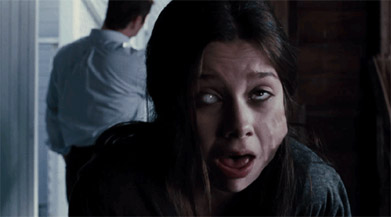Movie Review: The Possession
By Matthew Huntley
September 13, 2012
BoxOfficeProphets.com

As with most movies of this type, the opening shot informs us “the following is based on a true story,” and it gets even more specific by stating the events affected the family for exactly “29 days.” Perhaps the filmmakers thought this extra detail would make us believe it more. But whether or not the story is true should make no difference to the audience; what matters is how well it’s told. After all, at the end of the day, this is a horror movie, not a documentary. And, as a horror movie, we’re looking to judge it based on qualities like mood, atmosphere and its ability to scare us. We also take into account the performances and whether the filmmakers and actors succeed at getting us to care about the characters. The Possession is competent in all of these departments; it’s just too slow on the uptake.
The film opens with an older woman staring at a mysterious wooden box on her mantle. How long the box has been there, we don’t know, but it seems she’s had it most of her life. Funny how it’s only starting to drive her mad now. It’s obvious there’s something sinister about this box, as we can hear grave, disturbing noises emanating from it. The woman is disturbed and stressed, pulling out her hair, crying and ready to smash the box with a mallet when all of a sudden…well I won’t give away the details, but a few days later, Clyde (Jeffrey Dean Morgan) and his young daughters, Hannah (Jessica Davenport) and Em (Natasha Calis), stop by the house and purchase the box at a yard sale. Em is particularly fixated on it, despite not being able to open it or translate the Hebrew text engraved on the outside.
Clyde, a college basketball coach, and his wife, Stephanie (Kyra Sedgwick), have recently divorced and he’s just moved into a new house with creaky floors and big, open hallways. This makes for a perfect setting for ominous phenomena to occur, like giant moths flying out of the medicine cabinet; or a strange, invisible creature rummaging through the refrigerator; or Em’s body sharply and involuntarily moving about as if her dad was slapping her, even though he’s clearly not.
It takes Clyde a little too long, but he finally attributes these incidences to the box, and after Em goes on a violent rampage at school to get it back, he realizes the inexplicable grip it has on his daughter and decides to throw it away. But Em remains drawn to it and Clyde has no choice but to entertain the notion that perhaps the box is alive in some way. In a well-acted scene, he takes it to a colleague, a professor (Jay Brazeau) who specializes in demonic possession. What he tells Clyde, I won’t reveal, since the movie’s effect relies on us learning about the box just as characters do, but I liked the manner in which the professor irreverently makes light of the box’s powers and contents, which makes us question whether or not he really believes the things he teaches his students. The professor’s attitude was a fresh approach to familiar material.
Eventually, Clyde finds himself in a Hasidic Jewish neighborhood in New York City, beseeching the local rabbi for help. The rabbi solemnly tells Clyde that his situation is in the hands of God now, but his son, Tzadok (Matisyahu), says it’s Jewish law for him to help, which leads to the movie’s powerful climax in a hospital and one of the best religious purification scenes I’ve seen in the movies, and there have been many - too many. Director Ole Bornedal pulls out all the stops and the lighting, effects, sound design and editing work masterfully together to create a sequence that’s chilling, tense and scary. Based on the slow and perfunctory first half, I didn’t think the movie had it in it, but it rises to the occasion.
The performance by young Natasha Calis also deserves mention. She’s remarkable as Em and seems to know how important it is that we believe this trouble child is not just changing physically, but also behaviorally. Calis, intense and focused, convinces us of that.
Unfortunately, as I mentioned, the movie takes too long to get going. The first half has the standards of a B horror movie and it was frustrating to initially watch the characters behave like, well, horror movie characters instead of real, credible people. For instance, when Clyde rescues his daughter from the room full of moths, he’s too calm about it and doesn’t treat the incident as anything more than infestation, despite his house being brand new. I also didn’t buy the scene when Em’s schoolteacher (Brenda Crichlow) sits all alone in her classroom, late at night, grading papers in the dark. Do teachers really do this? The final scene is also a letdown, mostly because it seems tossed in just to appease horror aficionados. I was hoping the movie, which had taken off by this point, would have opted for intelligence and cleverness over routine sensationalism. But alas, it comes back to the same horror formula it worked so hard to overcome.
Given the excessive “possession” movies to come out of Hollywood every year, I wasn’t expecting much from The Possession, but I will say it’s one of the better examples of its kind. If the setup had been as crafty and thoughtful as the payoff, and had the filmmakers deep-sixed some of the more blatant horror conventions, it might have been a wholly substantive experience instead of just a partial one.